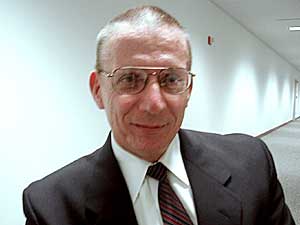|
Audio
Photos
Resources
Your Voice
|
Police work corrupted by culture of silence
October 28, 2004
A former Minneapolis police officer says a code of silence encourages unethical, even criminal, behavior among some cops. Michael Quinn says the code of silence encourages good cops to say nothing to prevent the bad behavior of other police officers. Quinn has written a book titled, "Walking With the Devil: The Police Code of Silence." He says it has angered some former colleagues. But he and others say the problem is pervasive and tempts some police to take the law into their own hands.
St. Paul, Minn. — Michael Quinn was two months into his job as a Minneapolis police rookie when he had his first encounter with the code of silence. It was 23 years ago. He and his training officer were walking the beat on Hennepin Ave. in downtown Minneapolis, when the older officer said he had a job on the side while he was on duty. He told Quinn to come along and offered him some of the money from the job. Quinn says he declined the money, and when he asked fellow officers what to do, they told him to ignore it.
"They said, 'Well, so what. Everybody's doing it to some degree or another -- including your sergeant -- so don't go to him,' and so I just kind of kept my mouth shut," he says.
 | |||
Michael Quinn's police pedigree includes a father who was a Minneapolis deputy chief, and a sister who is an agent with the Minnesota Bureau of Criminal Apprehension. Quinn's 23 years of Minneapolis police work include a stint as head of the department's training academy.
Why do police observe the code of silence? Because, Quinn says, they rely on each other for survival. He recalls a young Minneapolis police officer answering a domestic abuse call alone. He separated the woman from her attacker. The attacker then turned on the young officer and overpowered him. More police arrived on the scene, Quinn says, and overreacted. They beat the attacker senseless, sending him to the hospital.
Quinn says the young officer followed the code of silence, and didn't report the excessive force his fellow officers used in subduing the attacker.
|
Michael Quinn says the code changes the police motto "protect and serve" to "convict and incarcerate." It encourages police to take the law into their own hands, because they know there's little chance their wrongdoing will be exposed by other officers.
|
"He knows that what's happening isn't right, but at the same time, what these cops did is save his life and saved the life of the woman involved," Quinn says.
If observing the code protects police, protects citizens and puts bad people away, isn't it at worst, harmless and at best, beneficial? Quinn says no. He says the code changes the police motto "protect and serve" to "convict and incarcerate." It encourages police to take the law into their own hands, because they know there's little chance their wrongdoing will be exposed by other officers.
"Then we start having problems," Quinn says, "because then we start seeing that it's OK to start kicking in doors without warrants, that it's OK to make that drug arrest without really seeing them drop the drugs."
Neal Trautman agrees with Michael Quinn. Trautman is a former cop who now trains police officers around the country. He says a recent survey of law enforcement personnel shows nearly half have witnessed police wrongdoing and have kept quiet about it.
Trautman says in many cases cops have no one to turn to for help, because the survey shows higher-ranking officers are involved in writing false reports or other acts that cover up police wrongdoing.
"Seventy three percent of the time it was the direct supervisor who was intimidating or threatening them, or forcing them to participate in the code of silence," Trautman says.
Michael Quinn admits he's succumbed to the code of silence -- and has covered up for other cops during his 23 years as a Minneapolis police officer. On another occasion, he says, he reported an officer's misconduct, only to have the deputy chief tell the offending officer Quinn snitched on him. That episode, he says, led to a death threat from the cop Quinn turned in.
Quinn says in other cases he's told fellow officers he wants no part of their behavior, and they've stopped their misconduct at least around him. Law enforcement educator Neal Trautman agrees that officers won't get much support for breaking the code of silence by going to police brass, since so many law enforcement administrators go along with it. He says most administrators need better ethical training to see how the silence encourages misconduct. He says officers on the street will get the message.
Michael Quinn talks about his new book, "Walking With the Devil" The Police Code of Silence," Thursday evening, Oct. 28, at Walker Community Church in south Minneapolis.
|
News Headlines
|
Related Subjects
|

